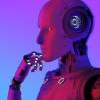AI will not replace you, but people who use it may

Artificial intelligence (AI) has been a hot topic for debate in recent times and has generated a lot of hype and speculation. Some believe that AI will soon replace most jobs and leave many people unemployed. However, this is a myth and a misunderstanding of the true capabilities and limitations of AI. Let's take a look at why AI will not replace your job and why there is no need to fear its integration into the workforce.
First, AI is still in the early stages of development and has limited capabilities. It is not yet advanced enough to replace human intelligence and creativity. For example, AI can process and analyse large amounts of data quickly, but it cannot match human intuition, empathy, and critical thinking skills. These are unique human abilities that cannot be replicated by AI. Moreover, AI is still not capable of dealing with unstructured data and making decisions in complex situations, which are essential tasks for many jobs.
Second, AI is not designed to replace humans, but to enhance and augment their capabilities. AI is meant to be a tool that can assist humans in their work and make their lives easier. For example, AI can help doctors diagnose diseases by analysing medical images, but it cannot replace a doctor's expertise, experience, and patient interaction skills. The goal of AI is to work with humans and help them do their jobs better, not to replace them.
AI also requires human oversight and maintenance. AI systems require constant monitoring and updating to ensure they are functioning correctly and to avoid errors and biases. This means that there will always be a need for human experts who understand how AI works and can manage its deployment and use. In addition, AI algorithms require training and data sets to be updated regularly, which also requires human intervention.
There are also ethical and legal considerations that must be addressed when using AI in the workplace. AI algorithms can be biassed and make unfair decisions if the data they are trained on is not representative or free from bias. There are also privacy and security concerns when it comes to the use of AI and the processing of personal data. These issues require human experts to oversee the use of AI and ensure that it is being used ethically and responsibly.
Finally, AI cannot replace the human touch in many jobs. For example, in customer service, personal interactions are crucial for building trust and understanding. AI-powered chatbots may be able to handle simple inquiries, but they cannot replace the emotional intelligence and empathy of human customer service representatives. Similarly, in education, personal interaction and mentorship are critical for student success, and AI cannot replace the role of teachers and instructors.
It is also important to note that AI is not a one-size-fits-all solution. The potential applications of AI are numerous and varied, but it is not suitable for all jobs. Moreover, the impact of AI on the job market will depend on the specific industry and job type. Some industries, such as finance and healthcare, are likely to adopt AI more quickly and see more significant changes. Other industries, such as the arts and creative fields, are less likely to be impacted by AI. This is because AI is not yet capable of replicating human creativity, imagination, and artistic expression.
It is also important to consider the potential benefits of AI for workers and the economy as a whole. AI can help to increase efficiency, reduce costs, and improve productivity. This can lead to the creation of new and better-paying jobs, as well as the development of new industries and businesses. For example, the development of AI-powered customer service chatbots has created new jobs for experts who design and manage these systems.
Another important factor to consider is the role of government and employers in ensuring that workers are not left behind as AI is adopted in the workplace. Governments and employers have a responsibility to invest in training and education programs that help workers acquire new skills and stay relevant in the changing job market. This includes programs that help workers adapt to new technologies and prepare for the jobs of the future.
AI is a tool that can assist and augment human intelligence, not replace it. While AI has the ability to automate many routine tasks, it does not have the emotional intelligence, creativity, or ethical judgement that are unique to human beings. This means that AI is best used as a tool to enhance human capabilities, not as a replacement for human workers.
Now, the fun part.
Parts of this argument were put forward by ChatGPT, the AI that many of us in the writing and editing field fear will replace us. We found its arguments convincing. But we also found our fears manifesting because of how well it constructed its arguments and how decently it was written, albeit without much creativity, emotion, or structure.
But as it argued, and it showed in its demonstration, the AI is nowhere near perfect. At least for now, it remains merely a tool. Like many of our counterparts, we at Toggle, will not shy away from using it for research and presentation, despite it possibly being our biggest threat.
By the looks of it, no doubt that in the near future, the tedious and repetitive work of research and non-creative writing will be taken up by AI, at least by some margin. But the fact that we still had to heavily edit, rewrite and reconstruct this entire article to get it ready for publication, tells us that, that day is not today.
Judgement day, not just yet. But John Connor better be ready.

 For all latest news, follow The Daily Star's Google News channel.
For all latest news, follow The Daily Star's Google News channel. 








Comments